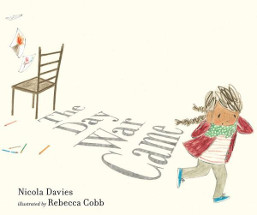The day war came by Nicola Davies

Ill. by Rebecca Cobb. Walker Books, 2018. ISBN 9781406376326
(Age: all) Highly recommended. Themes; War, Refugees, Displacement,
Children in war, Education. The things we take for granted are all
turned upside down in this picture book showing one child's torment
as she loses everything she holds dear, to war. We expect to be
safe, to be housed and fed, to have access to clean water and food,
and be able to go to school. But when war comes, imposing its mayhem
on a small town where the children are at school, and the parents at
home or at work, everything that is known and accepted is no longer
the same. The town is razed to the ground, noise and dust and debris
separates the girl from her peers and family, and without
possessions or friends, she must follow others as they head to a
place of safety. Finding a town she is shunned by the occupants. War
has got to them too. Finding a school, she asks to be let in,
but war has taken hold there too, and she is rejected, the teacher
saying there is no chair for her to sit on.
This heart breaking story will resonate with children when they see
how so simple an excuse can be given for the child not being
accepted. It symbolises the plight of refugees the world over, being
rejected, or left in detention camps, allowed to live out their
lives without hope. And with echoes of the 'no room at the inn'
story, this is a book that will engender much discussion in the
classroom.
The beautiful illustrations will haunt the reader, the wide open
expressions of the children, the devastated village contrasting so
explicitly with the colour and uninterrupted life of the unscathed
town, the symbol of the chair. The story offers hope after the
children bring along chairs for the refugee children to sit upon and
the stunning endpapers begin with a double page of empty chairs, and
at the end all of them filled with children, safe and learning.
An end page tells the background of the story, initiated by the UK
rejection of 3,000 unaccompanied refugee children in 2016, and
hearing a tale of a child being refused entry to a school because
there was no chair for her. Now chairs appear online supporting
refugee children and their right to education.
This is a memorable and moving book. Classroom
ideas are available.
Fran Knight